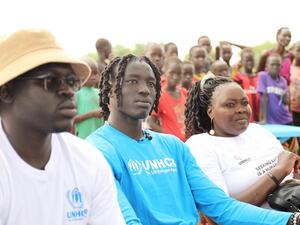Continuing conflict in Iraq's province displaces thousands, some for second time
Continuing conflict in Iraq's province displaces thousands, some for second time

This infant was caught having a nap in Al Qaim in western Anbar. He fled there with his mother and siblings to escape the violence in Anbar, which is entering a third month.
GENEVA, March 7 (UNHCR) - The UN refugee agency on Friday said the continuing fighting in western Iraq's Anbar province has forced thousands more people to move to safety. Those affected are in various locations across the province, moving westwards from previously safe locations.
"During the last week the number of displaced people in the town of Heet and surrounding areas - which lies to the northwest of [the city of] Ramadi - has increased by some 25,000-30,000 people," UNHCR spokesman Adrian Edwards told journalists in Geneva.
Elsewhere in Anbar, an inter-agency mission this week by UNHCR, the World Food Programme and the UN Children's Fund assessed the living conditions and the needs of displaced people living in Al-Obaidy, some 450 kilometres northwest of Baghdad in the Al Qaim area.
Due to the poor security situation, the mission was forced to postpone part of their assessment. Al Qaim district hosts some 5,000 Syrian refugees, some 2,000 of them are in camp Al Obaidy while others are in host communities. The team met with people displaced to temporary houses and two collective shelters in Al-Obaidy town.
The team members identified many with specific needs, particularly female-headed households with large numbers of children. In one home, three female-headed families were cramped together in one small house with 13 children.
While the local communities have generously assisted the displaced, people are still in need of food and health care. Families living in unfinished houses lack blankets, mattresses, cooking facilities and clothing. As an immediate step, UNHCR is distributing aid packs to 300 families the team visited.
"The humanitarian needs of the displaced are growing rapidly. Prolonged displacement is putting pressure on both the displaced and host communities as they begin to exhaust their resources," Edwards said.
UNHCR and other humanitarian agencies are receiving an increasing number of requests for humanitarian assistance and support. UNHCR and partners are continuing to conduct assessments of the humanitarian needs. At present the shortage of shelter remains one of the most pressing issues.
Close to Baghdad, the city of Fallujah remains under siege, the roads remain closed and there are reports of shortages of fuel, food and other basic items. Armed clashes have been reported in the north, south and east of Fallujah, even during a 72-hour ceasefire initiated by the government of Iraq last week.
The situation in Ramadi is also volatile. Shelling and clashes have continued in recent days in the city and in rural neighbourhoods. As the situation deteriorates in the Al-Malab, Al-Bothaib and 20th Street areas, small groups of residents have fled and headed to Heet. The local council in Heet is still welcoming those fleeing, despite the significant burden on the local infrastructure, lack of sufficient accommodation and overstretched services. The district already accommodates some 11,250 displaced families.
To the north-east of Anbar, the first UN humanitarian assistance has in the past few days reached some 200 displaced families living in dire conditions in Sulayman Beg, Salah Al-Din governorate. They fled clashes last week in the north-east of the governorate.
As of Thursday, the number of people displaced in Anbar and the other governorates of Iraq is approximately 380,000. This represents almost 64,000 families, some 42,000 of whom have been displaced in Anbar, the largest governorate in Iraq.
On Wednesday, the Ministry of Migration and Displacement and the UN launched a strategic response plan to address the immediate humanitarian needs of people affected by the fighting in Anbar. The plan calls for US$103.7 million to cover the provision of assistance to 240,000 internally displaced people as well as host communities and those stranded in conflict-affected areas.
UNHCR requires US$26.3 million to address humanitarian needs of people displaced by the crisis in Anbar over the next six months. These needs are 11 per cent funded.








